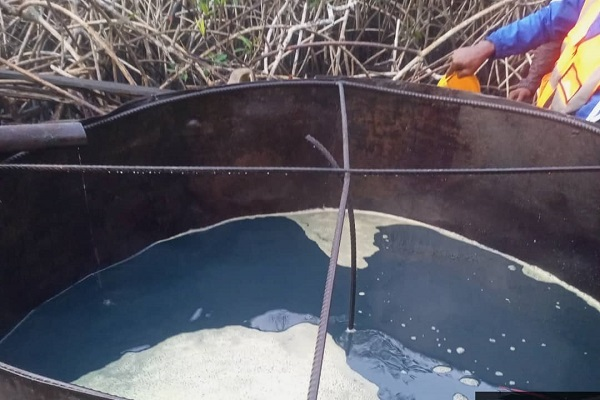In recent developments, the military forces in the Niger Delta region have made significant strides in curbing the rampant illegal refining activities that have plagued the region for years. This week, troops successfully destroyed 20 illegal oil refining sites across various locations within the Niger Delta, a region notorious for its involvement in unregulated oil production. These activities, which include illegal refining of crude oil into petroleum products such as diesel and kerosene, have not only devastated the local environment but have also contributed to the nation’s economic losses. In addition to dismantling the refineries, the operation led to the arrest of eight individuals believed to be involved in the illicit oil refining trade.
Illegal refining in the Niger Delta has been a persistent issue for decades. The region, which is the heart of Nigeria’s oil industry, is home to vast oil reserves that contribute significantly to the country’s national revenue. However, the wealth generated from these oil resources has failed to translate into the development of the region. Instead, widespread poverty, unemployment, and underdevelopment have given rise to illegal activities, such as oil theft and unauthorized refining. This illegal trade has become a lucrative business for many locals, driven by the lack of economic opportunities in the region.

The illegal refineries, often small-scale operations hidden in the creeks and remote villages, are typically set up with rudimentary equipment that is incapable of safely refining crude oil. These illegal facilities have severe environmental consequences, with toxic fumes, oil spills, and contamination of water sources. The chemicals used in the refining process are often hazardous, and the methods employed to extract petroleum products from crude oil are rudimentary and dangerous. As a result, the environment suffers long-term damage, and the health of the people living in these areas is compromised.
In recent years, the Nigerian government has increased efforts to tackle the illegal refinery menace, recognizing the damage it causes both to the environment and to the nation’s economy. The military, in particular, has been at the forefront of the crackdown, with the Nigerian Army launching regular operations to locate and destroy illegal refineries. These operations, which are part of a broader strategy to combat oil theft and other forms of economic sabotage, have been intensified in response to the growing scale of the problem.

This recent operation, which saw the destruction of 20 illegal refineries, is part of an ongoing initiative to eliminate such operations from the Niger Delta. The destruction of these sites was carried out after intelligence gathered by security forces indicated the locations of the illegal refineries. Armed with this information, troops swiftly moved in to dismantle the sites, seize the equipment, and destroy the illicitly refined products. The military action not only targeted the refineries themselves but also focused on arresting key individuals involved in the operations.
The eight individuals arrested during the operation are believed to be part of a larger network of criminals involved in the illegal refining business. These individuals have been handed over to the appropriate authorities for further investigation and prosecution. The arrests send a strong message to those who continue to engage in illegal refining and other forms of oil theft in the region. The Nigerian government, through these operations, is demonstrating its commitment to ridding the Niger Delta of illegal oil activities and the associated criminal networks.

The military’s efforts to dismantle illegal refineries are crucial not only for the environment but also for Nigeria’s economy. Illegal oil refining leads to substantial losses for the government, as the revenue from the refined products often never reaches the state. The crude oil used in these illegal refineries is typically stolen from pipelines, often involving sabotage and vandalism. This further exacerbates the financial losses suffered by the country, as the cost of repairs and the diversion of oil away from legal channels are considerable. By dismantling these refineries, the military is curtailing the economic impact of such activities and ensuring that the nation’s resources are better protected.
Environmental organizations have long condemned the illegal refining practices in the Niger Delta, highlighting the widespread pollution and destruction of natural habitats. The region, which is home to diverse ecosystems, has witnessed severe ecological degradation due to oil spills, gas flaring, and illegal refining. These activities have contributed to the loss of biodiversity, as well as the contamination of soil and water sources. Local communities are often the most affected, with many people relying on fishing and farming for their livelihoods. However, the contamination of the water and land has made these industries unsustainable for many.

Despite the military’s ongoing efforts, the problem of illegal refining in the Niger Delta remains a complex and deeply rooted issue. The lack of adequate infrastructure and economic opportunities in the region has made it difficult to completely eradicate the illegal refining trade. The economic challenges faced by the people of the Niger Delta, compounded by corruption and mismanagement, continue to drive many into these illicit activities as a means of survival. In addition, the security situation in the region, with militant groups operating in the area, complicates the efforts to completely stamp out illegal refining.
Nevertheless, the recent success in destroying 20 illegal refineries represents a significant step in the right direction. The operation not only disrupts the operations of illegal refinery operators but also demonstrates the government’s resolve to combat oil theft and its devastating consequences. It is hoped that such operations will be intensified, and that they will be supported by long-term strategies that address the underlying socio-economic issues in the Niger Delta.

Ultimately, tackling the issue of illegal refining in the Niger Delta requires a multi-faceted approach. In addition to military action, there is a need for greater investment in the region’s infrastructure, education, and job creation. By providing alternative livelihoods and improving the living conditions of the people in the Niger Delta, the government can reduce the appeal of illegal oil activities and pave the way for a more sustainable future for the region.
__________________________
Thank you for reading this piece. We hope you’re inspired by it. It might interest you to know that we organise workshops and seminars to empower young people. We can position you to win in your chosen career. Partner with us today! Find other related articles on our website and follow us on Instagram @InsideSuccessNigeria for more updates.



Leave a Reply